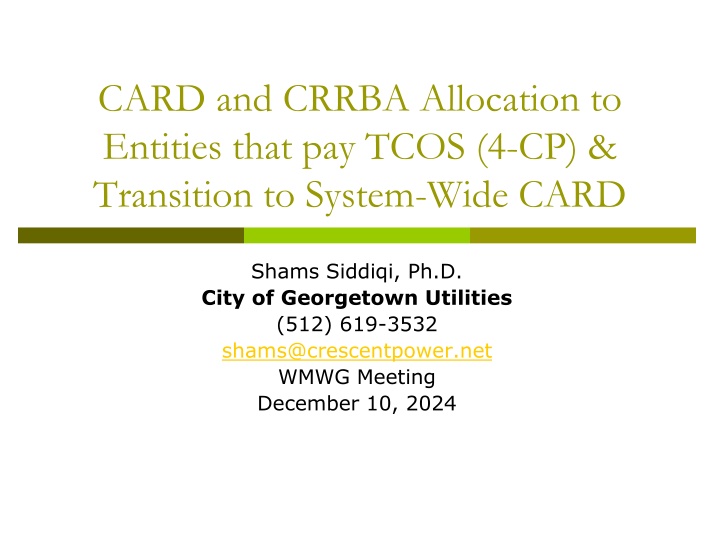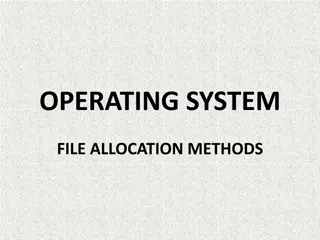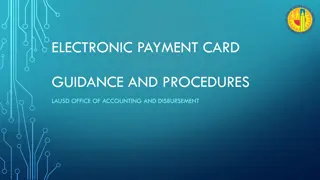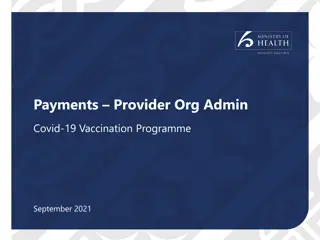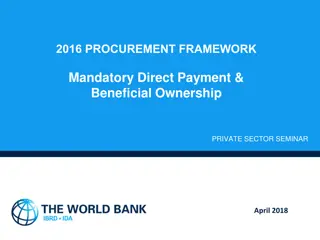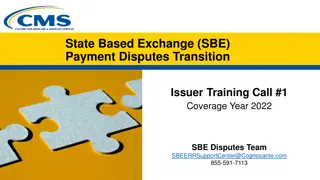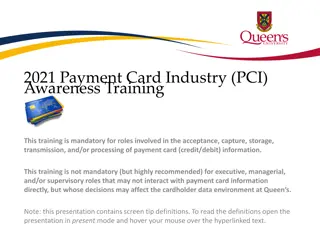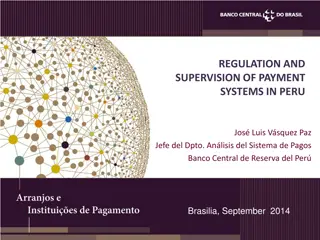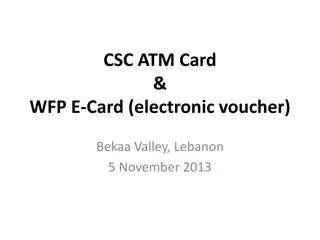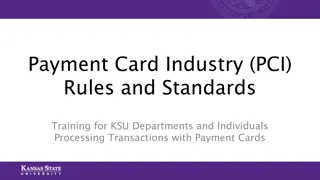Allocation of CARD and CRRBA to Entities for TCOS Payment & Transition
ERCOT addresses concerns of load impact on CARD and CRRBA payments, proposing equitable solutions to minimize price distortions, incentivize payment for transmission costs, and transition to system-wide CARD allocation.
Download Presentation

Please find below an Image/Link to download the presentation.
The content on the website is provided AS IS for your information and personal use only. It may not be sold, licensed, or shared on other websites without obtaining consent from the author.If you encounter any issues during the download, it is possible that the publisher has removed the file from their server.
You are allowed to download the files provided on this website for personal or commercial use, subject to the condition that they are used lawfully. All files are the property of their respective owners.
The content on the website is provided AS IS for your information and personal use only. It may not be sold, licensed, or shared on other websites without obtaining consent from the author.
E N D
Presentation Transcript
CARD and CRRBA Allocation to Entities that pay TCOS (4-CP) & Transition to System-Wide CARD Shams Siddiqi, Ph.D. City of Georgetown Utilities (512) 619-3532 shams@crescentpower.net WMWG Meeting December 10, 2024
Background ERCOT is concerned that flexible and controllable load will increase consumption during monthly Coincident Peak (CP) intervals to generate an increased share of the CARD and CRRBA payments. Since Transmission Cost of Service (TCOS) is allocated to Load on Summer 4- CP and TCOS greatly exceeds CARD and CRRBA, this issue currently does not exist during the Summer months. Allocation using any other method than CP for the Summer months actually creates perverse incentives and RT energy price distortions that will inefficiently impact the behavior of price sensitive Load. As little as $10/MWh CARD and CRRBA artificial price increase may result in modified LFL responses Sending such distorted energy prices and then admonishing Entities not to respond to such price signals is terribly flawed market design. December 2024 2
Obvious Solution (No Analysis Needed!) There is an obvious solution that eliminates price distortion caused by CARD and CRRBA while also minimizing 4-CP allocation price distortion: Allocate CARD and CRRBA using the same Allocation as TCOS i.e., allocate CARD and CRRBA using 4-CP Allocation This is also the most equitable solution Entities that pay for the transmission system receive the benefits of CARD and CRRBA All other proposals to date further reward 4-CP avoidance and not paying towards TCOS by not allocating CARD and CRRBA on CP basis for Summer months worsening price distortion with no justification. Apart from 4-CP, any other allocation in non-Summer months significantly distorts energy prices in those hours and would result in inefficient LFL behaviour makes no sense! Allocating using 4-CP greatly reduces the incentive for chasing 4-CP and for generation and load netting This is the market s opportunity to minimize the price distortion of 4-CP and eliminate any price distortion from CARD and CRRBA allocation this is a no-brainer no additional analysis is required! December 2024 3
Cap Allocation of Zonal CARD to TCOS Eliminating Zonal CARD allocation in favor of system-wide CARD allocation would be a sudden huge redistribution of CARD between the Zones As shown in ERCOT analysis, 4CP method is by far the closest allocation to the current allocation without any CARD related energy price distortion Thus, in order for the COG proposal to maintain the current distribution of CARD as closely as possible and gradually transition to system-wide CARD allocation: Cap CARD allocation to any Zone by its allocation of TCOS Once the CARD allocation cap is reached in one or more Zones within a year, distribute CARD to the Zones that have not reached their caps for the remainder of the year [System is far from reaching this milestone so maybe addressed in a separate NPRR if needed in the future] Once all Zones reach their CARD allocation cap, distribute CARD on a monthly system-wide LRS for the remainder of the year December 2024 4
Details of COG Proposed Solution CARD/CRRBA allocation using the 4CP method (prior-year 4CP) is: Pull load by LSE for the prior-year four summer 4CP intervals (excluding DC Tie exports, BLT Exports & WSL). [Note: no change to NPRR1030 allocation of CARD/CRRBA for DC Tie exports since transmission charge is a flat hourly rate for the entire year for DC Tie exports] Remove LSE data for terminated LSEs. Add a QSE attribute to the data based upon current LSE to QSE relationship. Aggregate 4CP load volumes by QSE. Create QSE level 4CP Load Ratio Share (LRS) (each QSE s Settlement extracts will show the allocation at LSE level as well). Allocate monthly CARD/CRRBA to QSEs based on this QSE-level 4CP LRS. Transition to system-wide CARD allocation by capping CARD allocation for each Zone based on that Zone s TCOS allocation 1. 2. 3. 4. 5. 6. December 2024 5
Comparison of Competing Proposals Feature COG Proposal Vistra Proposal IMM Proposal Shifting of CARD allocation from Residential/NOIE to Large C&I Energy Price Distortion to chase CARD outside 4CP 0% 3% (based on IMM estimate for about 100 hours/month) As high as $40/MWh (for Load - effectively reduces LZ SPP by this amount) No maintains current Zonal CARD distribution 6% (based on IMM estimate) $0/MWh As high as $10/MWh (for Load - effectively reduces LZ SPP by this amount) No maintains current Zonal CARD distribution Maintain Zonal CARD Allocation but transition to system-wide LRS Reduces incentive Yes - Transition to system-wide LRS through Zonal caps Yes No actually increases 4CP chasing incentive No actually increases 4CP chasing incentive December 2024 to avoid 4CP and net Gen & Load 6
